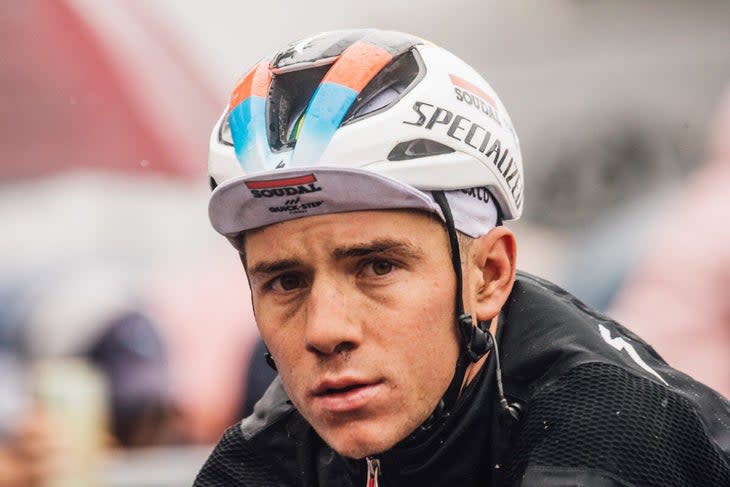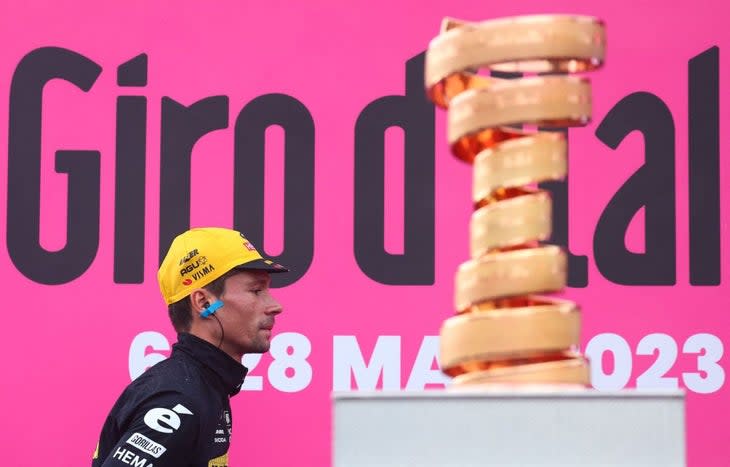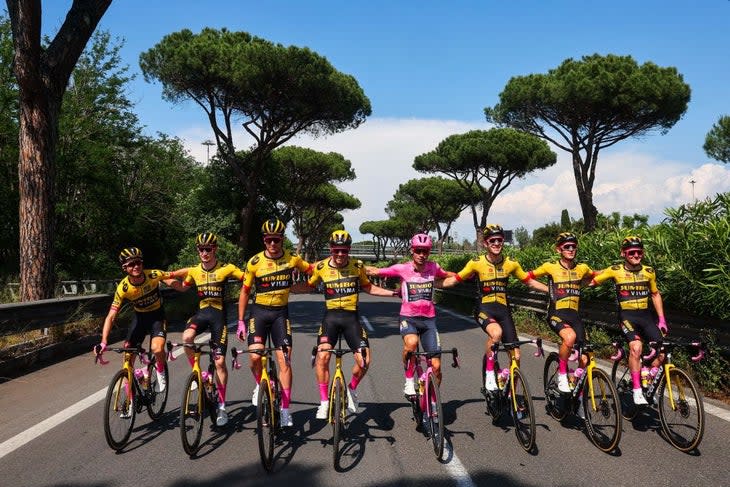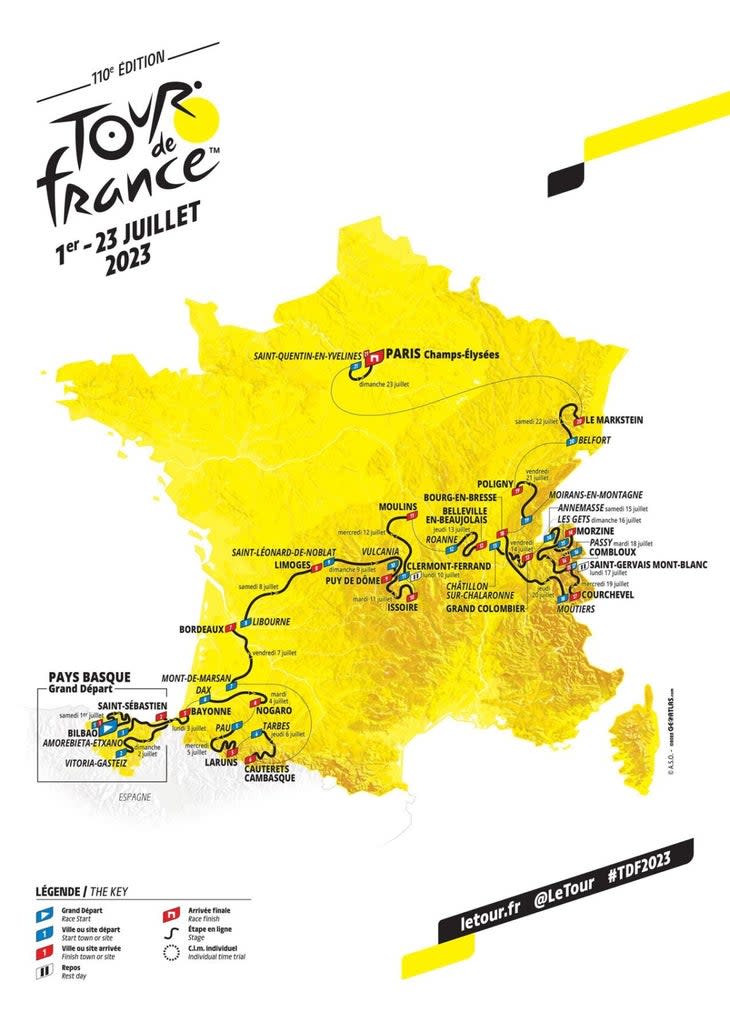Tour de France: Making the case why Remco Evenepoel and Primož Roglič should race
This article originally appeared on Velo News
This summer’s Tour de France packs all the ingredients of truly being a tasty one.
The 2023 Tour is primed to deliver two equally matched riders at the peak of their powers facing off for the yellow jersey, something relatively rare in Tour history.
More often than not, the Tour sees the emergence of a super-team backing one dominant rider for extended runs in the yellow jersey, something that sucks the tension out of the race that’s often devolved into a contest for leftovers. Think Miguel Indurain, Lance Armstrong, or Chris Froome, and you get the picture.
Yet this year we see Jonas Vingegaard and Tadej Pogacar squaring off in what could be as spectacular and thrilling as last year’s superb race, if not even better.
Also read: 30 days to the Tour de France -- why this year should be a great one
There are new plot lines that will keep things interesting all the way through July.
We will discover how Vingegaard handles the pressure of being defending champion, as well as see how Pogacar manages the stress of returning from his first serious injury. These two threads will play out across three weeks as they battle to emerge as the Tour’s new king.
Last year, Vingegaard could ride along the edges of Pogacar’s star power, something he won’t be able to enjoy with the No. 1 bib on his back. And Pogacar, hobbled by a broken wrist and hand, has never truly faced a health related setback in his otherwise smooth, near-perfect trajectory of his career so far. Everyone knows an injured lion is always more dangerous and unpredictable.
These will be new challenges for both riders, and uncertainty always delivers surprise on the roads of France.
But this Tour could be even better. How? By seeing Remco Evenepoel and Primoz Roglic toeing up to the start line in Bilbao on July 1.
It’s a shame that both riders, despite very logical reasons to sit out July, are opting not to race.
Those four are arguably the very best stage racers in the peloton right now, and it's even rarer in Tour history to see such a deep, high level of grand tour riders performing at their peak all at the same time.
Taking nothing away from the other teams and GC contenders, but seeing only half of the peloton’s grand tour bosses in the bunch takes a bit of air out of the race.
Racing now would pay dividends later for Evenepoel in yellow jersey quest

The arguments for skipping the Tour are convincing. Both are coming off the fatigue of racing the Giro d’Italia, the Tour was never on their respective racing calendars, and in the case of Evenepoel, the added uncertainty of coming off a COVID-19 infection all add up to passing on July.
Yet both are missing unique, once-in-a-career moments to race the Tour de France.
The most obvious is Evenepoel, who would start as world champion. It takes a lot of self-discipline and long-range vision to bypass the Tour’s hype and publicity bonanza that would come with showing off the prestigious rainbow jersey at the Super Bowl of cycling.
Also read: How the top pros build form for the Tour de France
Kudos to team boss Patrick Lefevere by standing firm on the Tour veto (as well as a Vuelta a Espana defense), especially if doctors say it's unwise for Evenepoel to race to race the Tour following the COVID case that saw him exit the Giro while in the maglia rosa. We've seen several high-profile riders who never fully recovered from COVID after pressing on too early to compete, so perhaps the smartest and most discreet thing to do is to let the Belgian superstar rest up to defend his worlds title, and race the Tour next year at full splendor. Health is the top priority.
Yet if Evenepoel is healthy enough to race this Tour, he should. Here’s why:
Evenepoel’s ultimate goal is to win the Tour, and at just 23, he’s got plenty of time on his side. The master plan calls for him to make his Tour debut in 2024, but winning in a Tour debut is rare. Pogacar’s debut yellow jersey in 2020 put him in elite company of Tour rookie winners that also includes Bernard Hinault, Eddy Merckx, and Fausto Coppi.
I'm excited to start racing again in Switzerland also with eyes on the Belgian Championship TT. 💪🏻🔥
After the BC, I will be joining the team on an altitude camp in Val di Fassa where I enjoyed training in the past very much. 🐺💙 pic.twitter.com/nXQGJr4B2K
-- Remco Evenepoel (@EvenepoelRemco) June 2, 2023
Instead, by racing next month, Evenepoel could use this Tour as a no-pressure recon race for future success. Soudal Quick-Step isn’t bringing a major GC rider anyway, so he wouldn’t be hurting a teammate’s chances if he shows up. The Tour is unlike any race on the calendar. Racing now would let him get a taste of the speed, the pressure, the tension, and the intensity that only July packs, and carry those lessons in 2024.
Even racing two weeks, chasing a stage or two and helping Julian Alaphilippe and Fabio Jakobsen along the way, would smooth the way for pathway toward the yellow jersey in 2024 and beyond.
By starting in July, he’d also deflate much of the hype that he will inevitably bring to the start line next summer. Of course, he’d be far from the finely tuned levels of Pogacar and Vingegaard next month, but Evenepoel is already expert at managing and surpassing expectations. Racing the Tour this year would only help him later.
Roglic could ride the coat-tails all the way to Paris

And the same goes for Roglic. What does he have to lose by racing the Tour?
The newly minted Giro winner could race the Tour with absolutely zero pressure, something that might be liberating for Roglic.
He could ride the coat-tails of Vingegaard and slip into the Jumbo-Visma train. He could assume the role that he played last year as kind of a super-domestic/GC No. 2. If he loses time early, it wouldn't matter. He would be there to help Vingegaard, perhaps when a stage, and if he’s still hanging around, then who knows. Having a legitimate second GC threat would only help Vingegaard to take on Pogacar.
Strange things happen in the Tour. There’s no guarantee that either Pogacar or Vingegaard will make it to Paris anyway. No one’s pulled off the Giro-Tour double since Marco Pantani in 1998, but Roglic is cagey and consistent. The team would be stronger by having him there, and he’s professional enough to know what his role would be.
Also read: Pogacar racing against time for Tour de France fitness
Both riders are at different ends of their careers, yet there are only so many doors of opportunities in elite men’s cycling.
Evenepoel is just starting, but he still hasn’t raced the Tour. Everything is very different at the Tour compared to any race on the calendar. Evenepoel is a natural-born, DNA freak machine, but he would do himself a huge favor and greatly increases odds of winning in 2024 and beyond by starting in 2023.
Sepp Kuss confirmed for Jumbo-Visma’s Tour de France team, Primoz Roglic rests ahead of possible Vuelta a Espana return.
The racing is just part of a big season for the Dutch squad as title backer confirms imminent withdrawal from partnership:https://t.co/WbJjxKQ2Yy
-- Velo (@velovelovelo__) June 3, 2023
And at 34 in October, one wonders how many more shots Roglic might have at the yellow jersey. Vingegaard is already the team’s top GC leader, with Roglic a close second. What would winning another Vuelta title do for Roglic? Sure, the team is harboring dreams of winning all three grand tours in the same season, but a rider of Roglic’s caliber deserves to be in the Tour.
Once a door of opportunity is shut, it’s impossible to reopen.
I remember a few years ago in major star finished second at a monument, and they shrugged their shoulders and said, “Well, I'll come back and win again next year or the year after, because I have my whole career ahead of me.” I also remember a veteran sports director shaking their heads and clucking, no you need to win now because there might not be a tomorrow. That rider never won that race.
In elite racing, nothing ever goes to plan

Part of me still believes that both of them will be at the start line next month.
I think Lefevere and Evenepoel could be playing a little bit of poker with everyone by saying he won't race the Tour, and a secretly leaving the door open for a late-hour surprise. After racing the Tour de Suisse in June, my hunch remains that the world champion will be in Bilbao.
And attrition could see Roglic end up in the Tour as well. Jumbo-Visma saw five of its eight planned starters for the Giro not make it, and with Steven Kruijswijk crashing out of the Criterium du Dauphine this week, the Tour team could soon be depleted. Another crash and a COVID case or two, and Roglic might be in Bilbao whether that was part of the plan or not.
As race organizers like to remind everyone, the Tour de France is the star. And the 2023 Tour will be great whether or not Roglic and Evenepoel race.
And not taking away anything from any one else at the start line, but this climb-heavy, unpredictable course design favors both Roglic and Evenepoel in so many ways that it seems like a missed opportunity for them not to race.
Nothing ever goes to plan in the WorldTour. Adjusting on the move is the sign of a great champion, and Roglic and Evenepoel have both proven nimble in the face of unexpected challenges.
Let’s hope they both throw caution to the wind, and go for it. The Tour de France will only be better for it.

For exclusive access to all of our fitness, gear, adventure, and travel stories, plus discounts on trips, events, and gear, sign up for Outside+ today.

